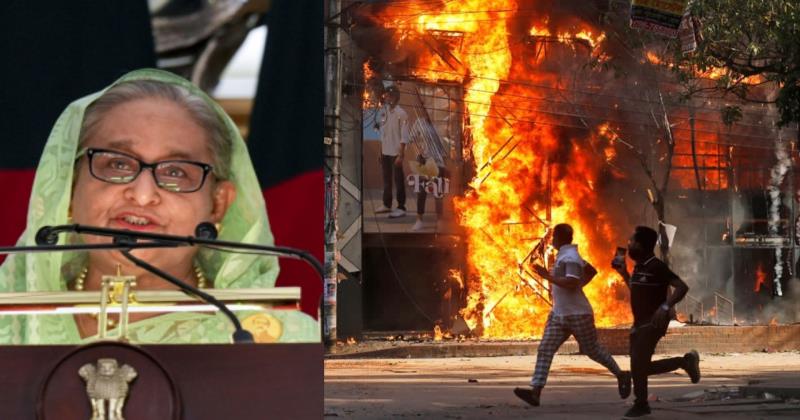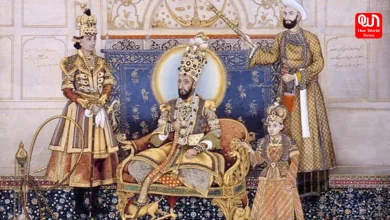Chaos in Bangladesh: Sheikh Hasina Resigns and Flees Amidst Deadly Clashes
Bangladesh is currently experiencing a significant political upheaval. What began as student protests over the government job quota system has now expanded into a full-scale nationwide demand for Prime Minister Sheikh Hasina's resignation.
Chaos in Bangladesh: Sheikh Hasina’s Escape Route from Bangladesh to the UK via India
Hours after her resignation and departure from Bangladesh, former Prime Minister Sheikh Hasina arrived in India on Monday evening. She landed at the Hindon airbase in Ghaziabad, where she met with National Security Advisor Ajit Doval. Sources report that Hasina was taken to a “safe house” and is expected to travel to the United Kingdom soon. This move comes amid a significant political crisis in Bangladesh, marked by widespread protests and violent clashes. Hasina’s resignation and subsequent flight highlight the severe instability and ongoing tensions within the country.

Read more: 5th anniversary of abrogation Article 370 – Know What PM Modi has to say !
Recent events in Bangladesh have led to a severe political crisis. Widespread student protests, initially sparked by issues with the government job quota system, have escalated into a nationwide call for Prime Minister Sheikh Hasina’s resignation. Reports indicate that over 150 people have died in the violent clashes, and the government’s response has been characterized by a heavy-handed crackdown, including curfews and internet blackouts.
In a bid to quell the unrest, Sheikh Hasina imposed a curfew and deployed the armed forces, which temporarily restored order. However, the opposition claims that the government is attempting to create a situation similar to the unrest in Sri Lanka to justify maintaining power. Amid the chaos, there are rumors that Sheikh Hasina has fled to India, seeking asylum.
#Bangladesh में #आरक्षण विरोधी हिंसक आंदोलन की वजह से प्रधानमंत्री #SheikhHasina की सरकार खतरे में है.#शेख_हसीना के इस्तीफे की मांग को लेकर सड़कों पर उतरे लोगों में से अभी तक 300 से ज्यादा लोगों की जान चली गई है.
संभावना है की जल्दी ही वहां की सेना देश की सत्ता संभाल लेगी. pic.twitter.com/4s9K8uualS— Ruby Arun रूबी अरुण 🇮🇳 (@arunruby08) August 5, 2024
The recent events in Bangladesh bear significant similarities to the riots in Sri Lanka a few years ago. Both situations involved widespread public protests fueled by deep-seated economic and political grievances, leading to severe political instability and the eventual flight of the country’s leader.
Common Factors:
Economic Hardships: Both countries faced severe economic crises, with inflation, corruption, and mismanagement contributing to widespread public discontent. In Sri Lanka, economic mismanagement and the pandemic exacerbated an already fragile economy, leading to shortages of essentials and a debt crisis. Similarly, in Bangladesh, economic issues like youth unemployment and corruption played a significant role in fueling the protests.
Public Protests and Violence: In both countries, public protests began over specific issues but quickly expanded to encompass broader discontent with the government. Sri Lanka saw massive protests against economic mismanagement and corruption, which escalated into calls for the president’s resignation. In Bangladesh, protests initially focused on the government job quota system but expanded to demand the resignation of Prime Minister Sheikh Hasina due to her handling of the situation and alleged corruption.
Government Crackdowns: Both governments responded with force to suppress the protests. In Sri Lanka, the government’s violent crackdown on protesters led to further unrest and international condemnation. Similarly, in Bangladesh, the government’s heavy-handed response, including curfews and internet blackouts, resulted in numerous casualties and further fueled public anger.
Leadership Flight: In both instances, the embattled leaders fled their respective countries. Sri Lankan President Gotabaya Rajapaksa fled the country amidst the protests, seeking refuge abroad. Similarly, Sheikh Hasina fled Bangladesh and sought refuge in India, with plans to move to the UK.
These parallels underscore the profound impact of economic instability and political mismanagement on national stability, highlighting the precariousness of leadership during times of crisis.
We’re now on WhatsApp. Click to join
Like this post?
Register at One World News to never miss out on videos, celeb interviews, and best reads.








